一般过去将来时基本用法
一般过去将来时的结构及用法

一般过去将来时的结构及用法一般过去将来时(future-in-the-past tense)是英语中用来谈论过去某一时间点的将来情况的时态。
它用于表示过去某一时间点所发生的将来动作、事件或状态。
这种时态通常在间接引语、故事叙述或过去条件、愿望等语境中使用。
一般过去将来时的结构如下:肯定句结构:would + 动词原形否定句结构:would not / wouldn't + 动词原形疑问句结构:Would + 主语 + 动词原形以下是一些例句:肯定句:- She said she would call me later.(她说她会稍后给我打电话。
)- He promised he would help me with my homework.(他答应会帮我做作业。
)否定句:- He told me he wouldn't come to the party.(他告诉我他不会来参加派对。
)- They said they would not be able to finish the project on time.(他们说他们无法按时完成这个项目。
)疑问句:- Would you like to join us for dinner?(你愿意和我们一起吃晚餐吗?)- He asked if I would be available for a meeting tomorrow.(他询问我明天是否有时间开会。
)需要注意的是,使用一般过去将来时时,动词本身不需要进行时态的变化,一般使用动词原形。
另外,如果间接引语的谓语动词是现在时态,则一般过去将来时会改为过去将来完成时。
例如:- She said, "I will call you tomorrow."(她说:“我明天会给你打电话。
”)→ She said she would call me the next day.(她说她第二天会给我打电话。
英语语法过去将来时及初中时态归纳概要
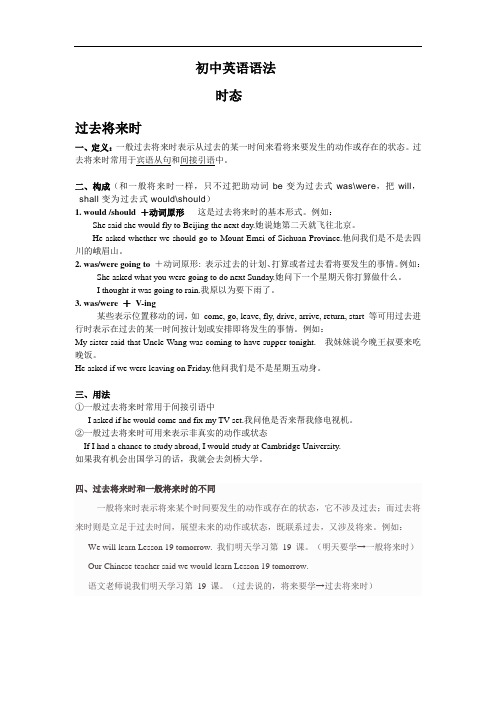
初中英语语法时态过去将来时一、定义:一般过去将来时表示从过去的某一时间来看将来要发生的动作或存在的状态。
过去将来时常用于宾语从句和间接引语中。
二、构成(和一般将来时一样,只不过把助动词be变为过去式was\were,把will,shall变为过去式would\should)1. would /should +动词原形这是过去将来时的基本形式。
例如:She said she would fly to Beijing the next day.她说她第二天就飞往北京。
He asked whether we should go to Mount Emei of Sichuan Province.他问我们是不是去四川的峨眉山。
2. was/were going to+动词原形: 表示过去的计划、打算或者过去看将要发生的事情。
例如:She asked what you were going to do next Sunday.她问下一个星期天你打算做什么。
I thought it was going to rain.我原以为要下雨了。
3. was/were +V-ing某些表示位置移动的词,如come, go, leave, fly, drive, arrive, return, start 等可用过去进行时表示在过去的某一时间按计划或安排即将发生的事情。
例如:My sister said that Uncle Wang was coming to have supper tonight. 我妹妹说今晚王叔要来吃晚饭。
He asked if we were leaving on Friday.他问我们是不是星期五动身。
三、用法①一般过去将来时常用于间接引语中I asked if he would come and fix my TV set.我问他是否来帮我修电视机。
②一般过去将来时可用来表示非真实的动作或状态If I had a chance to study abroad, I would study at Cambridge University.如果我有机会出国学习的话,我就会去剑桥大学。
一般将来时和过去将来时
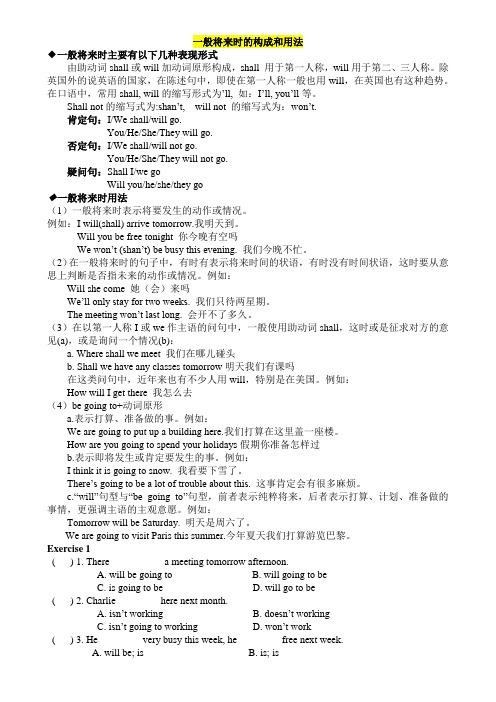
一般将来时的构成和用法◆一般将来时主要有以下几种表现形式由助动词shall或will加动词原形构成,shall 用于第一人称,will用于第二、三人称。
除英国外的说英语的国家,在陈述句中,即使在第一人称一般也用will,在英国也有这种趋势。
在口语中,常用shall, will的缩写形式为’ll, 如:I’ll, you’ll等。
Shall not的缩写式为:shan’t, will not 的缩写式为:won’t.肯定句:I/We shall/will go.You/He/She/They will go.否定句:I/We shall/will not go.You/He/She/They will not go.疑问句:Shall I/we goWill you/he/she/they go◆一般将来时用法(1)一般将来时表示将要发生的动作或情况。
例如:I will(shall) arrive tomorrow.我明天到。
Will you be free tonight 你今晚有空吗We won’t (shan’t) be busy this evening. 我们今晚不忙。
(2)在一般将来时的句子中,有时有表示将来时间的状语,有时没有时间状语,这时要从意思上判断是否指未来的动作或情况。
例如:Will she come 她(会)来吗We’ll only stay for two weeks. 我们只待两星期。
The meeting won’t last long. 会开不了多久。
(3)在以第一人称I或we作主语的问句中,一般使用助动词shall,这时或是征求对方的意见(a),或是询问一个情况(b):a. Where shall we meet 我们在哪儿碰头b. Shall we have any classes tomorrow明天我们有课吗在这类问句中,近年来也有不少人用will,特别是在美国。
一般现在时,一般过去时,一般将来时及现在进行时
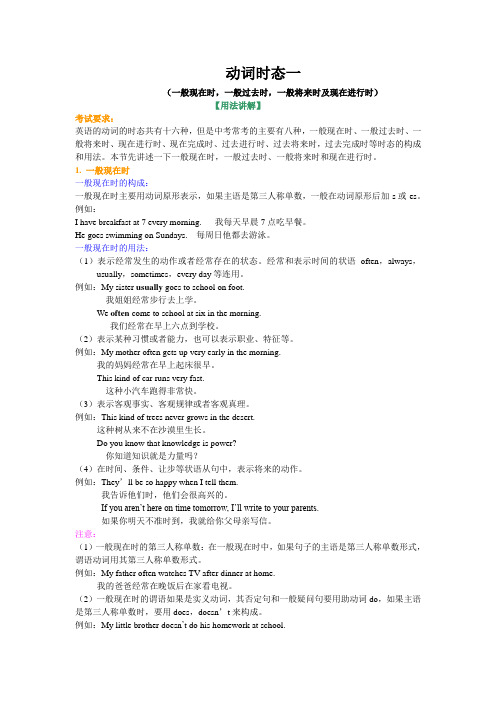
动词时态一(一般现在时,一般过去时,一般将来时及现在进行时)【用法讲解】考试要求:英语的动词的时态共有十六种,但是中考常考的主要有八种,一般现在时、一般过去时、一般将来时、现在进行时、现在完成时、过去进行时、过去将来时,过去完成时等时态的构成和用法。
本节先讲述一下一般现在时,一般过去时、一般将来时和现在进行时。
1. 一般现在时一般现在时的构成:一般现在时主要用动词原形表示,如果主语是第三人称单数,一般在动词原形后加-s或-es。
例如:I have breakfast at 7 every morning. 我每天早晨7点吃早餐。
He goes swimming on Sundays. 每周日他都去游泳。
一般现在时的用法:(1)表示经常发生的动作或者经常存在的状态。
经常和表示时间的状语often,always,usually,sometimes,every day等连用。
例如:My sister usually goes to school on foot.我姐姐经常步行去上学。
We often come to school at six in the morning.我们经常在早上六点到学校。
(2)表示某种习惯或者能力,也可以表示职业、特征等。
例如:My mother often gets up very early in the morning.我的妈妈经常在早上起床很早。
This kind of car runs very fast.这种小汽车跑得非常快。
(3)表示客观事实、客观规律或者客观真理。
例如:This kind of trees never grows in the desert.这种树从来不在沙漠里生长。
Do you know that knowledge is power?你知道知识就是力量吗?(4)在时间、条件、让步等状语从句中,表示将来的动作。
例如:They’ll be so happy when I tell them.我告诉他们时,他们会很高兴的。
掌握时态一般将来时和过去将来时

掌握时态一般将来时和过去将来时一般将来时和过去将来时是英语中常用的两种时态形式,它们帮助我们描述将来发生的动作或事件,同时强调时间的关系。
在本文中,我们将重点探讨这两种时态的用法和相应的例句。
一、一般将来时(Simple Future Tense)一般将来时用来表达将来某个时间发生的动作或事件。
我们可以使用以下几种结构来构成一般将来时:1. 使用“will + 动词原形”构成句子,表示决定或预测的未来动作或事件。
例如:- I will visit my grandparents this weekend.(我会在这个周末去拜访我的祖父母。
)- He will be a doctor when he grows up.(他长大后会成为一名医生。
)2. 使用“be going to + 动词原形”表示计划、意愿或打算去做某事。
例如:- I am going to study abroad next year.(明年我打算出国留学。
)- She is going to have a party on Friday.(她打算在周五举办一个派对。
)3. 使用“shall + 动词原形”构成句子,表示“我将”,主要用于“我们”(“we”)和“我”(“I”)。
例如:- We shall meet at the park tomorrow.(明天我们将在公园见面。
)- Shall I help you with the bags?(我应该帮你拿行李吗?)二、过去将来时(Future in the Past Tense)过去将来时用于描述在过去某个时间点将来会发生的动作或事件。
我们可以使用以下结构来构成过去将来时:1. 使用“would + 动词原形”构成句子,表示过去某个时间点的将来动作。
例如:- He said he would come to the party.(他说他会来参加派对。
)- She told me she would give me a call later.(她告诉我她稍后会给我打电话。
英语时态:过去将来时

英语时态:过去将来时过去将来时(The Past Future Tense)通常来说指的是一般过去将来时(The Simple Past Future Tense),表示从过去的某一时间来看将来要发生的动作或呈现的状态,基本出发点是过去,过去某一时刻以后要发生的事情;过去将来时常用于宾语从句中。
Ⅰ. 句法结构:1.陈述句:A. 肯定形式:主语+be going to /would/should +动词原形+其他B. 否定形式:主语+be not going to或would/should not+动原+其他注:a. 否定形式直接在助动词后加not。
b. be going to结构中的be动词指was和were。
c. would/should+动原结构在谓语两态变化中无人称和数的变化。
2.疑问句:A. 一般疑问句:助动词提前即可①Was/Were+主语+ going to +动词原形+其他②Would/Should+主语+动词原形+其他B.特殊疑问句:特殊疑问词+一般疑问句(同上)3.被动语态:主语+ 助动词(结构) + be +动词过去分词【被动结构be done,时体现在助动词】➢两态变化例句参考下表:注意:一般情况下,一般将来过去时都在宾语从句中出现,所以在变成一般疑问句和特殊疑问句时,将主句变成疑问句语序即可,宾语从句仍保持陈述句结构。
eg. Did you know that he would make cakes? (变一般疑问句)Did you know when he would make cakes? (变特殊疑问句)Ⅰ. 主要用法:1.“would+动词原形”常表示主观意愿的将来。
He said he would come to see me.He told me he would go to Beijing.2.“was/were going to+动词原形”常表示按计划或安排即将发生的事。
一般将来时和过去将来时的基本用法
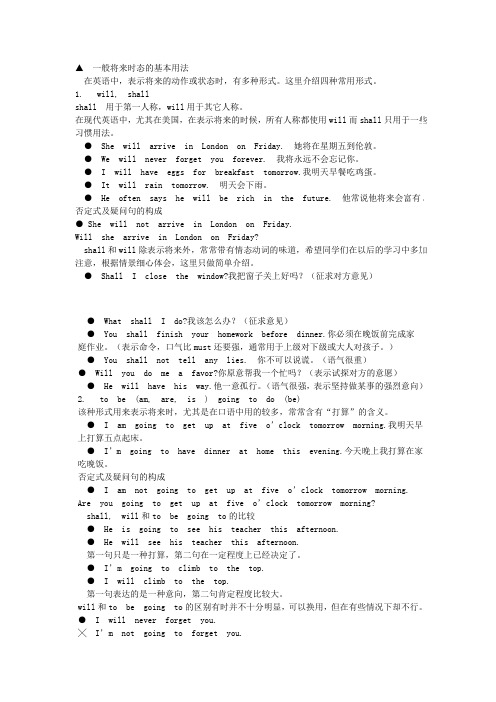
●She will not arrive in London on Friday.
Will she arrive inLondonon Friday?
shall和will除表示将来外,常常带有情态动词的味道,希望同学们在以后的学习中多加注意,根据情景细心体会,这里只做简单介绍。
●Shall I close the window?我把窗子关上好吗?(征求对方意见)
●I am going to get up at five o’clock tomorrow morning.我明天早上打算五点起床。
●I’m going to have dinner at home this evening.今天晚上我打算在家吃晚饭。
否定式及疑问句的构成
●I am not going to get up at five o’clock tomorrow morning.
1. would , should
should用于第一人称,would用于其他人称。
在现代英语中,尤其在美国,所有人称都用would.
●I thought he would take the chance.我想他会抓住这个机会。(相对于thought这个过去时态的将来)
●I knew he would be a good teacher.我早知他会成为一个好老师。(相对于knew这个过去时态的将来)
I knew you would agree.我当时就知道你会同意的。
【注】在一定的语境中也可于其他从句或句子中:
It was six o’clock. The sun would soon set.这时是六点钟。太阳即将落山。
2.除“would+动词原形”外,过去将来时还有以下常见表达方式:
中考英语备考:初中英语主要时态系列讲座(三)----一般将来时与过去将来时精讲及练习(含答
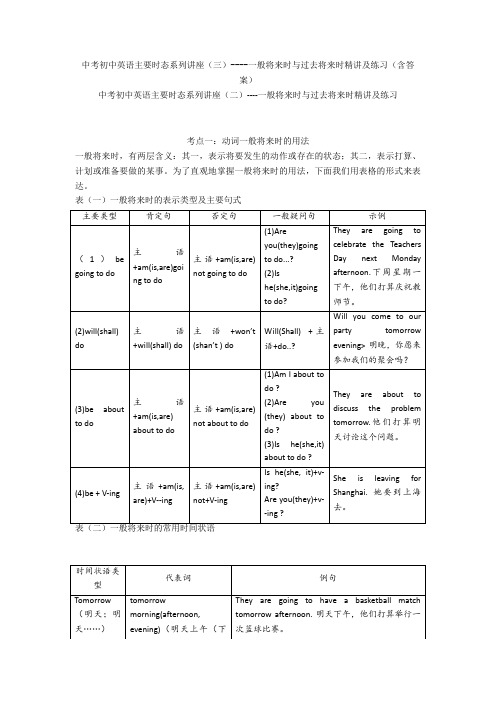
中考初中英语主要时态系列讲座(三)----一般将来时与过去将来时精讲及练习(含答案)中考初中英语主要时态系列讲座(二)----一般将来时与过去将来时精讲及练习考点一:动词一般将来时的用法一般将来时,有两层含义:其一,表示将要发生的动作或存在的状态;其二,表示打算、计划或准备要做的某事。
为了直观地掌握一般将来时的用法,下面我们用表格的形式来表达。
表(一)一般将来时的表示类型及主要句式表(三)一般将来时的主要用法(天津)---What is your plan for next weekend,Lingling?----I volunteer work in the museum.A. was doingB. didC. have doneD. am going to do【析】正确答案D。
句意是:玲玲,下周末的安排是什么?我打算到博物馆去作志愿者。
根据上文的next weekend(下周末)可知,玲玲的回答是指下周的打算,所以用一般将来时,因此,正确答案为D。
【典型考例】(四川内江)---Have you watched the new movie,Joe?---No,I________ it with my sister this evening.A.watch B.are watching C.watched D.will watch【析】正确答案:D。
句意是:乔,你看了这部新电影吗?没有。
我今晚将和我妹妹一起去看。
根据本句末的时间状语this evening可知,看新电影这动作是将来要做的事情,因此动词使用一般将来时。
所以,正确答案为D。
【典型考例】(天津)----Could you tell me for the fruit?----By paying over the Internet.A. how much will I payB. how much I will payC. how will I payD. how I will pay【析】正确答案D。
- 1、下载文档前请自行甄别文档内容的完整性,平台不提供额外的编辑、内容补充、找答案等附加服务。
- 2、"仅部分预览"的文档,不可在线预览部分如存在完整性等问题,可反馈申请退款(可完整预览的文档不适用该条件!)。
- 3、如文档侵犯您的权益,请联系客服反馈,我们会尽快为您处理(人工客服工作时间:9:00-18:30)。
英语语法必读法宝:动词(十一)一般过去将来时基本用法今日语法:一般过去将来时基本用法一般过去将来的构成如下:肯定式否定式I shall work I should not workHe (she,it) would work He(she,it)would not workWe should work We should not workYou would work You would not workThey would work They would not work一般过去将来时基本用法1 一般过去将来时表示在过去将来的某一时间发生的动作或存在的状态。
一般过去将来时常用在间接引语中,主句谓语动词为过去时态。
如:You know I would come你知道我会来的We never imagined that John would become a doctor我们从来没有想过约翰会成为一个医生。
2一般过去将来时有时候可带时间状语如:Late at night on November 28, 1938.Dr Bethune got word that a battle would soon begin1938年11月28日深夜,白求恩大夫接到通知说,一场战斗不久将打响。
如 the next day确是说话人时刻的第二天也可以用tomorrowHe said he would come back tomorrow他说他明天回来。
3 一般过去将来时可用来表示非真实的动作或是状态如:If i had a chance to study abroad , i would study at Cambridge University.如果我有机会出国学习的话,我就去剑桥大学4 一般过去将来其他表达法。
was/were going to +动词原形如:He said that he was going to live in the country when he retired 他说他退休后要住在农村was/were +动词-ing 形式如:Nobady know whether the guests were coming没有人知道客人是否会赖。
was/were +动词不定式如:It was reported that another bridge was to be built across the Yangtse River 据报道长江上将要再建一座大桥过去将来时过去将来时表示从过去某个时间看将要或将来发生的事,它的基本形式为would/ should +动词原形 (should用于第一人称I 和we)。
例如:I thought he wouldn't attend that evening party, but to our surprise, he came. 我以为他不会参加那个晚会,但是令我们惊奇的是,他来了。
I said on Tuesday that I should see my friend in Beijing the next day. 我星期二说过,第二天我要到北京看我的朋友。
除了would和should以外,过去将来是还可以由以下形式来表示1.was/were going toI was going to see Mrs. Ked the next day, but the appointment has been cancelled. 我本打算第二天去看基德先生,但是约会被取消了。
Tim said he would/was going to wash his car the next Sunday.汤姆说他下个星期天会清洗车子。
2. was/were about toI couldn't go to Tom's birthday party as I was about to go to hospital.我不能参加汤姆的生日会,因为我要去医院。
3.was/were to这些形式可以表示曾在过去预计发生并且发生了的事,或者表示过去无法预见的结果,常用在间接引语的宾语从句。
Little did they know they were to be reunited ten years later. 他们不会知道十年后他们将会重逢。
4.过去将来时态中的否定形式The radio broadcast said that it was not going to snow tomorrow.电台广播说明天不会下雪He explained that he was not going to take part in the sports meeting.他解释说他将不参加运动会。
5.过去将来时常用于间接引语中He said they would arrange a party.他说他们将安排一个晚会。
I asked if he would come and fix my TV set.我问他是否来帮我修电视机。
6. 过去将来时可用来表示非真实的动作或状态If I had a chance to study abroad, I would study at Cambridge University.如果我有机会出国学习的话,我就会去剑桥大学。
I wish he would go with me to the cinema tonight.今晚他能和我一起去看电影就好了。
7.was/were + 动词-ing形式Nobody knew whether the guests were coming.没人知道客人们是否要来。
I was told that the train was leaving in a few minutes.我被告知火车几分钟后就要开了。
今天练习写出动词的正确形态1 I thought you (_____) the chance (take)我以为你会去试一试呢2 He said he (________) the next day(come back)他说他第二天回来。
3 They thought it (_________) to rain (be go)他们认为要下雨了4 I was told that the train (____) in a few minutes (be leave)我被告知火车几分钟后就要开了。
5 She said she (_______) the classroom after school。
(be to clean)她说她放学后要打扫教室答案公布1 would take2 would come back3 was going4 was leaving5 was to clean过去将来时练习题1. On television last night the newscaster announced that the leader ________ on Saturday.A. is arrivingB. will arriveC. would be arrivedD. would arrive2. He told us that he would begin the dictation when we________ ready.A. will beB. would beC. wereD. are3. My aunt ________ to see us, she would be here soon.A. is corningB. was comingC. cameD. had came4. They would be given a new house if more ________ the next year.A. will be builtB. would be builtC. are builtD. were built5.--Alice, why didn’t you come yesterday?--I ___, but I had an unexpected visitor.A. hadB. wouldC. was going toD. did6.--Come in, Peter, I want to show you something.--Oh, how nice of you! I ___ you ___ to bring me a gift.A. never think; are goingB. never thought; were goingC. didn’t think; were goingD. hadn’t thought; were going7. This morning Alice ___ out ___ the door opened and in came some strangers.A. was just about to go; whileB. went ; whenC. was going ; whileD. was just about to go; when8.We were all surprised when he made it clear that he ___ office soon.A. LeavesB. would leaveC. LeftD. had left 答案:1. D2. C3. B4. D 5 C 6. B 7.D 8. B。
